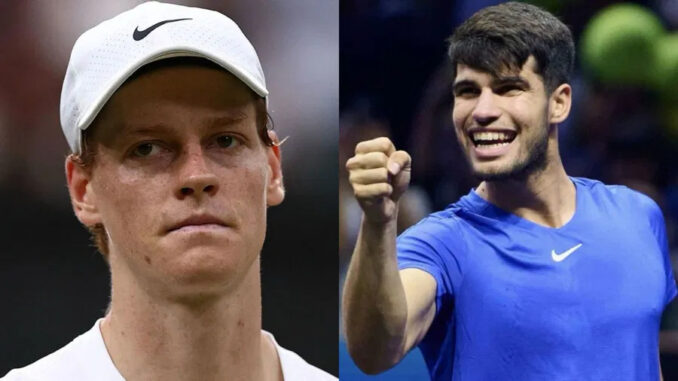
The demanding world of professional tennis often sees its brightest stars juggling rigorous schedules, intense competition, and the constant pressure to perform. Amidst this high-stakes environment, a sense of camaraderie often blossoms between players, even as rivalries ignite on the court. This dynamic was recently illustrated when Carlos Alcaraz, the electrifying Spanish talent, offered his perspective on Jannik Sinner’s unexpected withdrawal from the Rotterdam Open. Alcaraz’s remarks, delivered with a touch of playful humor, hinted at the complex interplay of factors that influence players’ decisions in this demanding sport.
Sinner’s absence from the Rotterdam tournament, a crucial stop on the ATP tour, sent ripples through the tennis world. The Italian star, renowned for his powerful groundstrokes and unwavering focus, was a highly anticipated contender. His withdrawal, however, left a void in the tournament and sparked a wave of speculation among fans and pundits alike. While official statements cited physical reasons for Sinner’s inability to compete, the timing of the announcement inevitably fueled conjecture about the true motives behind his decision.
Alcaraz, known for his infectious energy and playful demeanor, addressed the situation with a characteristic blend of humor and insight. While careful not to directly criticize his fellow competitor, Alcaraz’s observations offered a glimpse into the challenges players face when navigating the grueling tour schedule and prioritizing their well-being. He acknowledged the relentless nature of the professional circuit, emphasizing the constant travel and the necessity of maintaining peak physical condition to compete at the highest level.
“It’s a long, long season,” Alcaraz commented, his words echoing the sentiments of many players who grapple with the physical demands of the tennis calendar. “We’re traveling almost every week, playing tournaments back-to-back, and it takes a toll on the body.” This sentiment resonates deeply within the tennis community, where players often struggle to strike a balance between the desire to participate in every event and the crucial need for rest and recovery. The constant transatlantic flights, the rapid transitions between time zones, and the sheer physical exertion of high-intensity matches can lead to burnout, injuries, and a diminished ability to perform at one’s best.
Alcaraz’s remarks also subtly touched upon the strategic considerations that often guide players’ decisions regarding tournament participation. While the prestige of competing in renowned events like Rotterdam is undeniable, players must also strategically manage their schedules to maximize their long-term success. Sometimes, withdrawing from a tournament, even a significant one, can be a calculated move to conserve energy and ensure peak performance at later, more important events. This careful management of one’s competitive calendar is a hallmark of seasoned professionals who understand the delicate balance between short-term gains and long-term sustainability.
“Sometimes you have to make tough calls,” Alcaraz observed, hinting at the difficult choices players face when weighing their options. “It’s not always easy, but you have to think about what’s best for your body and your career in the long run.” This understanding of the strategic element involved in tournament selection reflects a maturity and wisdom beyond Alcaraz’s years. He recognizes that thriving in professional tennis requires not only talent and dedication, but also a shrewd understanding of how to manage one’s physical and mental resources effectively.
The situation surrounding Sinner’s withdrawal also underscores the growing emphasis on player well-being in professional sports. In recent years, there has been an increasing awareness of the mental and physical toll that elite competition can exact on athletes. Organizations like the ATP have implemented measures to support players’ well-being, recognizing that a healthy and balanced athlete is more likely to flourish both on and off the court. This shift in focus reflects a growing understanding that athletes are not just performers, but also individuals with complex needs and vulnerabilities.
While Alcaraz’s comments about Sinner were delivered with a lighthearted touch, they also underscored the respect and understanding that exists between players on the tour. Despite their fierce battles on the court, there is a strong sense of camaraderie among the athletes, who share the common experience of navigating the unique challenges of professional tennis. They understand the pressures, the sacrifices, and the triumphs that come with competing at the highest level of the game.
The Rotterdam Open, even without Sinner’s presence, showcased the remarkable depth of talent in men’s tennis. The tournament served as a reminder of the exciting rivalries and compelling storylines that continue to unfold on the professional circuit. As the season progresses, fans can anticipate more thrilling matches, dramatic upsets, and captivating displays of athleticism and skill.
As for Sinner, his absence from Rotterdam will hopefully provide him with the rest and recovery he needs to return to the court rejuvenated and ready to compete. His talent and potential are undeniable, and he is sure to be a formidable force in future tournaments. The tennis world eagerly awaits his return, anticipating the exciting battles he will undoubtedly engage in with players like Alcaraz and other top contenders. The dynamic interplay between these rising stars will continue to shape the future of professional tennis for years to come.
Leave a Reply